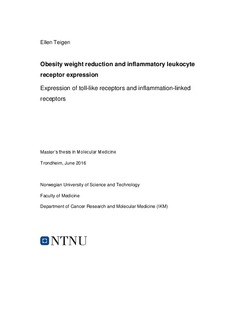| dc.description.abstract | Obesity is defined as accumulation and storage of excessive body fat, and is increasing worldwide. Obesity is associated with diseases as diabetes mellitus type 2 and cardiovascular diseases. A hallmark of obesity is chronic inflammation, with elevated levels of inflammatory markers. Blood leukocytes express inflammatory cell-surface receptors that plays a role in the chronic inflammation associated with obesity. In the present study the focus was on toll-like receptors TLR2 and TLR4, CD14, CD16, CD36, monocyte CD14/CD16, as well as the celladhesion receptors CD11b and CD66b. The aim of this study was to determine if the obese condition following a diet would affect the expression of the inflammation-linked leukocyte receptors in blood. Cell-surface receptor expression was measured by flow cytometry before and after obese weight loss using a very low calorie diet (VLCD), following a stabilization period. In addition, gene expression levels of the receptors (TLR2, TLR4, CD14, CD36) were determined by RT-qPCR, as well as the soluble CD14. The main findings were an increase in cell-surface receptor expression on leukocytes after weight loss (W8), with maintenance in expression level following the stabilization period (W12). The expression levels were elevated after weight loss; For TLR2 and TLR4, an increase in receptor expression was observed after weight loss, and further on an increased proportion of leukocytes expressing the receptors, which might be of importance in defense. The scavenger receptor for oxLDL, CD36, increased after weight loss, as well as the proportion of monocytes expressing high amounts of CD36. The percentage distribution of CD14/CD16 monocyte subpopulations showed small changes in the inflammatory and intermediate monocytes after weight loss, while the main classical monocyte population increased. The cell-adhesion receptors CD11b and CD66b increased after weight loss. CD11b also contributes in phagocytosis of invading targets, thus an increased expression might have consequences for this function. In conclusion, there was found an effect of weight loss and diet intervention on the expression patterns of the selected receptors (TLR2, TLR4, CD14, CD36, CD16, CD11b, CD66b and monocytes CD14/CD16) on the monocytes, granulocytes and eosinophils. These changes might have consequences for the defense properties and/or in relation to the inflammatory behaviors. | nb_NO |
